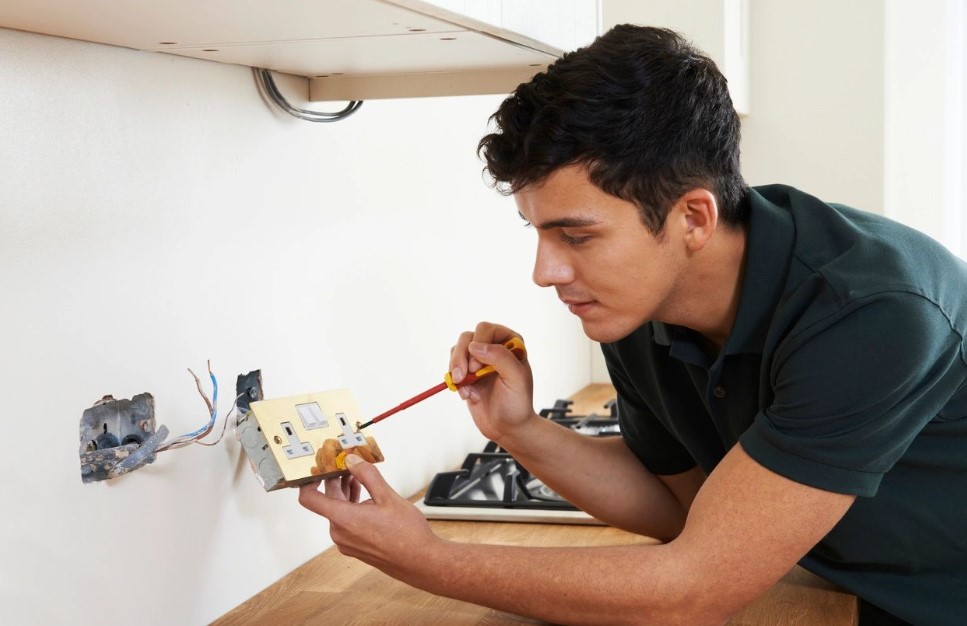
Hand tools are the foundation of any electrical contractor’s toolkit. High-quality screwdrivers, pliers, wire strippers, and voltage testers ensure precision and safety. Electricians rely on insulated tools to prevent electric shock while working with live circuits. A durable set of cutting tools, such as lineman’s pliers and cable cutters, is essential for handling wires of different gauges. Investing in ergonomic and durable tools increases efficiency and minimizes fatigue, helping professionals perform their tasks effectively.
Advanced Power Tools for Efficiency
Power tools simplify complex electrical installations and repairs. Cordless drills, reciprocating saws, and rotary tools allow contractors to work faster and more efficiently. Modern lithium-ion batteries provide longer runtimes, reducing the need for frequent recharges.
A conduit bender is another must-have tool for shaping pipes to fit electrical installations. Choosing high-quality power tools enhances accuracy, reduces labor, and ensures a more professional finish in every electrical project.
Reliable Electrical Testing Equipment
Accurate testing equipment is crucial in the electrical industry. Multimeters help electricians measure voltage, current, and resistance, ensuring that circuits function correctly. Clamp meters provide a contact-free way to measure current flow, increasing safety.
Circuit testers quickly identify live wires and detect faults. Infrared thermometers and thermal imaging cameras help locate overheating components before they fail. Using reliable testing tools enhances troubleshooting, preventing electrical hazards and ensuring compliance with safety standards.
Essential Safety Gear for Electrical Contractors
Safety should always be a priority in electrical work. Insulated gloves protect against electric shock, while safety glasses shield eyes from sparks and debris.
Hard hats are crucial when working in construction environments to prevent head injuries. Fire-resistant clothing reduces the risk of burns from electrical arcs. Contractors should also use non-conductive footwear to minimize the risk of accidental shocks.
Equipping oneself with proper safety gear ensures compliance with industry regulations and protects workers from potential dangers.
Organizational Tools to Improve Workflow
Staying organized is key to efficiency. A well-structured tool belt or tool bag keeps essential items within reach, reducing downtime. Label makers help electricians tag wires and panels for easy identification.
Portable workbenches and magnetic trays keep tools and small components organized during projects. Digital note-taking apps allow contractors to document wiring layouts and job progress seamlessly. A structured workspace minimizes errors and increases productivity on the job site.
Modern Technology and Smart Devices
Technology plays an increasing role in the electrical industry. Smart meters and digital load centers provide real-time insights into power usage. Mobile apps offer instant access to wiring diagrams, electrical codes, and troubleshooting guides.
Drones are now being used for inspecting power lines and electrical installations in hard-to-reach areas. Contractors who embrace technology stay ahead in the industry by improving accuracy, reducing errors, and enhancing overall efficiency.
High-Quality Electrical Cables and Connectors
Using high-quality cables and connectors is essential for reliable electrical installations. Contractors must choose the right type of wire for each application, ensuring compliance with voltage ratings and safety standards.
Waterproof and weather-resistant connectors enhance durability in outdoor installations. Proper cable management solutions, such as conduits and cable ties, keep wiring neat and prevent hazards. Investing in premium wiring components results in safer and longer-lasting electrical systems.
Professional Training and Certifications
Staying up to date with industry standards requires continuous learning. Enrolling in a Basic Electrician Course helps contractors build foundational knowledge and refine technical skills.
Certifications, such as those from the National Electrical Contractors Association (NECA) or OSHA, enhance credibility and job prospects. Attending industry workshops and trade shows provides exposure to the latest advancements.
Lifelong learning ensures that electricians stay competitive and deliver high-quality services to clients.
Software Tools for Electrical Project Management
Managing multiple projects efficiently requires the right software. Electrical estimating software helps contractors calculate material costs and labor expenses accurately. Blueprint design applications allow electricians to create detailed wiring diagrams. Cloud-based collaboration tools enable seamless communication between team members and clients.
Time-tracking apps help contractors manage schedules and deadlines effectively. Integrating software solutions into daily operations optimizes workflow and improves business productivity.
Networking and Business Development Resources
Expanding an electrical contracting business requires effective networking. Joining professional associations, such as the Independent Electrical Contractors (IEC), offers valuable industry connections.
Online forums and social media groups provide platforms for knowledge-sharing and staying updated on market trends. Attending trade fairs and local business events helps contractors establish relationships with potential clients. Building a strong network increases opportunities for project collaborations and business growth.
Conclusion
Equipping yourself with the right tools and resources enhances efficiency, safety, and professionalism in electrical contracting. From essential hand tools to advanced software solutions, every resource contributes to success.
Enrolling in a Basic Electrician Course ensures a solid foundation, helping contractors refine their expertise. By integrating modern technology, maintaining high safety standards, and continuously upgrading skills, electrical professionals can thrive in an evolving industry.





Leave a Reply